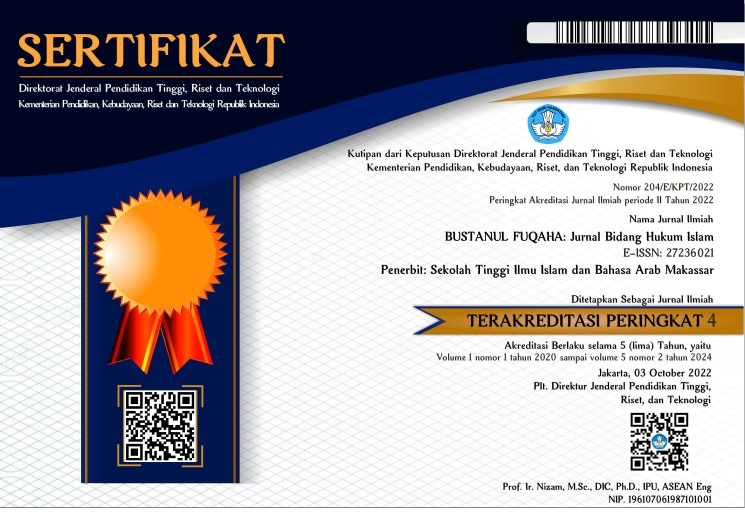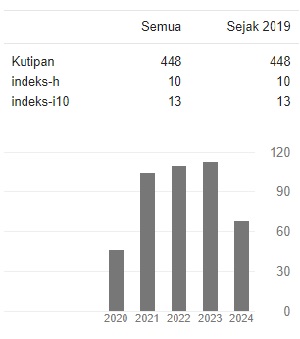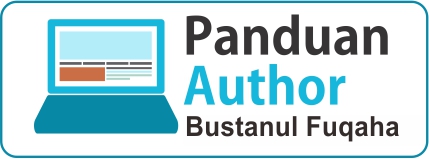Fikih Demonstrasi Perspektif Dewan Syariah Wahdah Islamiyah (Telaah Praktik Aksi Damai Wahdah Islamiyah di Kota Makassar)
Fiqh of Demonstration in the Perspective of the Shari'a Council of Wahdah Islamiyah (An Analysis of the Practice of the Peaceful Action of Wahdah Islamiyah in Makassar)
DOI:
https://doi.org/10.36701/bustanul.v2i1.304Keywords:
Fiqh, Dewan Syariah, Peaceful Protests.Abstract
This study aims to describe the form of the Wahdah Islamiyah demonstration in the city of Makassar and to reveal how to formulate a fiqh demonstration so that it takes place safely and comfortably. Elaborating on the recommendations of the Syari'ah Council in dealing with anarchist protests. This research used field research (field research) with qualitative methods using a juridical approach (legislation), normative theological approach, and historical approach. The results of this study indicate; (a) The form of the Wahdah Islamiyah demonstration is based on the stipulation that the demonstration is the final step in solving the problem after the deliberation and dialogue stages have been carried out, the demands in the action are what is allowed in shari'ah, to be peaceful and to maintain Islamic ethics; (b) The manifestation of the implementation of the Wahdah Islamiyah demonstration in the 411 and 212 Peaceful Actions in Makassar City shows the realization of the fiqh of the demonstration established by the Syari'ah Wahdah Islamiyah Council so that it takes place safely, comfortably and productively; (c) Early education to all levels of society in the form of weekly intensive coaching (Tarbiyah) as the right solution recommended by the Syari'ah Wahdah Islamiyah Council in preventing anarchism demonstrations. The implication of this research is to provide understanding for public awareness of religion, nation, and state will form a pattern of problem-solving without violence but productively.
Downloads
References
Ahmad, Muhammad Ṣidqī ibn. al-Wajīz Īḍāhi Qawāid al-Fiqhi al-Kulliyyah, Beirut: Dāru al-Risālah al - ‘Ālamiyyah, 1422 H.
Budiardjo, Miriam. Dasar-Dasar Ilmu Politik. Jakarta: Gramedia Pustaka Utama, 2008.
Departemen Agama RI. al-Qur’an dan Terjemahannya (Bandung: PT. Sygma Examedia Arkanleema, 2009.
Komaruddin, Kamus Istilah Skripsi dan Tesis. Bandung; Angkasa, 2009.
Mubarak, Islahuddin Ramadhan., Sulkifli Herman, dan Rahmat Saputra. "Metode Istinbath Dewan Syariah Wahdah Islamiyah dalam Menetapkan Hukum BPJS Kesehatan Mandiri." BUSTANUL FUQAHA: Jurnal Bidang Hukum Islam 1.1 (2020): 60-78.
Pranadji, Tri. “Aksi Unjuk Rasa dan Radikalisme serta Penanganannya dalam Alam Demokrasi di Indonesia.” Forum Penelitian Agro Ekonomi 26 No. 2 (2008): 132-143.
Suhendri. “Hak Kebebasan Berpendapat dan bereksperi dalam ruang Publik di Era Digital.” ‘Adalah: Buletin Hukum & Keadilan 4, No.3 (2020): 37- 48.
Sugiono. Metode Penelitian: Pendekatan Kuantitatif, Kualitatif, dan R&D. Cet. XI; Bandung: CV. Alfa Beta, 2011.
Tempo, Rachmat Bin Badani., Akhmad Hanafi Dain Yunta dan Saifullah Bin Anshor. Tinjauan Fikih Terhadap Nasihat kepada Penguasa. NUKHBATUL'ULUM: Jurnal Bidang Kajian Islam 5 No. 2 (2019), 106-124.
Tim Mawad Tarbiyah Marhalah Ta’rifiyah. Panduan dan Mawad Tarbiyah Ta’rifiyah, Makassar: Departemen Kaderisasi Wahdah Islamiyah, t.th.
Tim Metodologi Ijtihad dan Fatwa Dewan Syari’ah Wahdah Islamiyah. Himpunan Keputusan Dewan Syari’ah Wahdah Islamiyah, edisi II, Makassar: Dewan Syari’ah Wahdah Islamiyah, 2019.
Umar, Muhammad. Meredam amarah Terhadap pemerintah Menyikapi Kejahatan penguasa Menurut Alquran dan Assunnah. Pekalongan; Pustaka Sumayyah, 2006.
Yasid, H. Abu. Fiqh Today 1: Fatwa tradisional untuk Orang Modern Fikih Kontroversial. Jakarta: Penerbit Erlangga, 2007.
Yudisia, Sinta dan Tim FLP. SPIRIT 212; Cinta Ini Menyatukan Kita. Jakarta: Forum Lingkar Pena (FLP), 2017.














